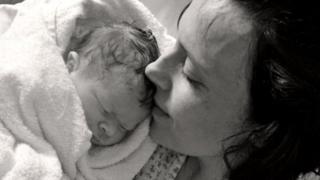Shropshire baby deaths: Families could pull out of inquiry
 Image copyright Richard Stanton
Image copyright Richard Stanton Families who have alleged failings at an NHS trust could pull out of an inquiry into their babies’ deaths.
Some object to the Royal College of Obstetricians and Gynaecologists being part of the overseeing review panel.
Rhiannon Davies, whose baby Kate died in 2009, said its role in the review of Shrewsbury and Telford NHS Trust, the biggest inquiry into claims of maternity failure, was “inappropriate”.
NHS Improvement (NHSI) defended the inquiry as “independent”.
NHSI, the regulator that is heading the review, invited the Royal College of Obstetricians and Gynaecologists (RCOG) to participate in the scrutiny panel, despite being aware of concerns about its recent history at the health trust which families say puts the college in a compromising position.
Ms Davies has fought alongside Kayleigh Griffiths, whose daughter Pippa died avoidably in 2016, to establish the review.
Ms Davies said: “NHSI have chosen to invite some highly inappropriate individuals.
“I will be taking some time to consider whether I will allow Kate’s case to be part of the review.”
She added: “This is a once-in-a-generation opportunity that has been afforded the entire NHS by Kate and by Pippa.”
A spokesperson for NHSI said: “The review remains independent and NHS Improvement will ensure that families are given the answers they need and that lessons are learnt.”
More than 200 families have contacted the review of maternity care at the trust, many of whom allege that babies and mothers died avoidably or suffered long-term harm as a result of poor care.
The allegations are mainly centred on a period from 1998 to 2017, although a few cases date back further.
A spokesperson for the RCOG said it “refutes” any claims it is “compromised”.
“The RCOG has a remit to improve standards of healthcare for women in the UK and around the world, working tirelessly to deliver this in the most comprehensive way possible. The RCOG has not received any correspondence from families.”
In the summer of 2017, the trust invited the college to carry out a review of its maternity services, which found significant problems, including “patient safety issues”.
The trust did not publish the report and the college failed to tell regulators of its concerns.
In December 2017, there were three unexpected deaths in the maternity unit, including that of Devan and Gavin Cadwallade’s daughter.
The college agreed to meet representatives from the trust in London, in April 2018, who were keen to show that services were improving.
In what the college itself described as an unprecedented move, it agreed to write a second report, which highlighted improvements in care, despite what families alleged was the shaky nature of the evidence provided by the trust.
The trust highlighted this second report when it published both reports in the summer of last year.
However, in August, the regulator the Care Quality Commission (CQC) conducted an inspection of maternity services at the trust and rated them inadequate.
The Shrewsbury and Telford NHS Trust said it was working with all parties.
Analysis, Michael Buchanan, BBC News social affairs correspondent
This is a spectacularly boneheaded decision by NHS Improvement.
The families had confidence in the review team being led by experienced midwife Donna Ockenden, and trusted her to uncover the extent of the failures at the Shrewsbury trust.
A panel of professionals reviewing the work of the Ockenden team was always part of the terms of reference of the inquiry, but the families are incredulous that the college, whom they regard as being complicit in the trust’s failures, have been invited to participate.
There are any number of independent gynaecologists and obstetricians they could have invited instead, and the decision highlights once more that NHS regulators often give the impression of acting like a cosy club, oblivious to the concerns of families and patients.
Follow BBC West Midlands on Facebook, on Twitter, and sign up for local news updates direct to your phone.

